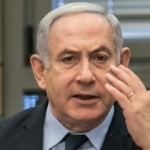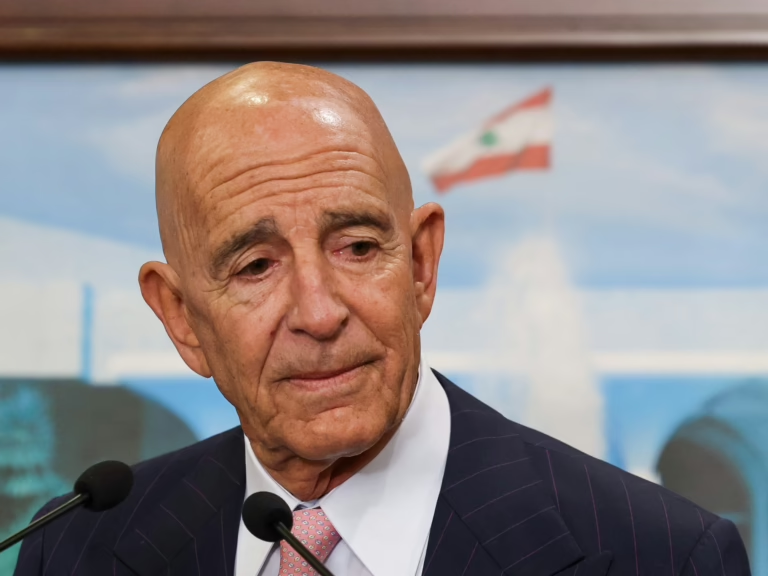The responsibility of persuading Hezbollah to disarm lies solely with the Lebanese government, according to Tom Barrack, the US special envoy for Syrian affairs, who emphasized that the United States has no intention of exerting pressure on any party. Barrack shared these views in an interview with Al Jazeera.
His remarks followed a firm rejection from Hezbollah’s deputy leader, Naim Qassem, who dismissed the Lebanese government’s ongoing efforts to enforce the group’s disarmament-a key element of the ceasefire agreement reached between Israel and Lebanon in November.
“Our weapons are non-negotiable; we will never surrender them,” Qassem declared on Saturday, asserting that Hezbollah will persist in opposing any initiatives perceived to benefit Israel. The group argues that the disarmament strategy endorsed by Lebanon’s government primarily advances Israeli interests.
The United States, alongside its close ally Israel, has long advocated for Hezbollah’s complete disarmament. This demand intensified after Hezbollah launched rocket attacks against Israel shortly following the outbreak of hostilities in Gaza on October 7, 2023. By the time a ceasefire was brokered on November 27, Israeli military operations had significantly degraded Hezbollah’s combat capabilities and resulted in over 4,000 casualties.
Despite these setbacks, Hezbollah continues to wield considerable political influence as a representative of Lebanon’s Shia community, with its affiliates holding parliamentary seats.
In a candid discussion with Al Jazeera Arabic, Barrack acknowledged Hezbollah as “a legitimate political entity within Lebanon,” highlighting the complexities introduced by Lebanon’s sectarian power-sharing framework, which allocates political roles among religious groups. This system complicates efforts to resolve the ongoing conflict with Israel.
Frequent Israeli Military Actions
The US envoy described Hezbollah-designated by the US as a foreign terrorist organization-as “an integral component of Lebanon’s political landscape.”
This reality presents a “challenging dilemma for Lebanese leaders,” who have nonetheless endorsed a US-supported plan calling for Hezbollah to relinquish its weapons.
On August 7, Lebanon’s cabinet approved this disarmament initiative despite Hezbollah’s outright opposition, raising concerns about potential escalations in Israeli military responses.
Since the ceasefire, Israel has maintained a presence in disputed Lebanese territories and has conducted near-daily airstrikes in southern Lebanon.
Lebanon’s National News Agency reported a series of Israeli air raids near the southern towns of Kfar Rumman and Jarmak, along with a drone strike targeting a residence in Humin.
Barrack reiterated that while the US is prepared to assist Lebanon in resolving its internal conflicts, it does not see itself as responsible for enforcing disarmament. “We do not impose pressure or dictate Lebanon’s course of action, nor do we do so to Israel,” he stated.
He added, “This is an internal Lebanese issue. For Lebanon to establish a unified military and a functioning state, it must disarm factions and militias that operate outside state control.”
The envoy also noted that tensions with Israel are likely to persist “as long as Israel perceives Hezbollah as a hostile force that is rebuilding and rearming.”
US Focus on Syria and Gaza’s Future
Barrack conveyed that US President Donald Trump is “keen” to bring an end to the Gaza conflict and is actively seeking an effective resolution.
“After engaging with Arab leaders, the president recognized the urgency of advancing swiftly toward peace,” Barrack told Al Jazeera.
The envoy also welcomed Syria’s recent reentry into the United Nations General Assembly after nearly six decades, a development made possible by the removal of former President Bashar al-Assad.
Since al-Assad’s departure in January, Syria’s interim president, Ahmed al-Sharaa, has initiated reforms including the establishment of new governmental bodies, plans for upcoming elections, and efforts to attract foreign investment.
Reflecting a shift in US policy toward post-Assad Syria, the US removed Hayat Tahrir al-Sham (HTS)-the armed group led by al-Sharaa-from its list of designated foreign terrorist organizations in July.
Barrack expressed that President Trump has opted to “offer them an opportunity” and praised al-Sharaa’s attempts to address ongoing conflicts in Syria’s southern and northeastern regions.
“Progress takes time, but they are making every effort possible,” the envoy concluded.

















